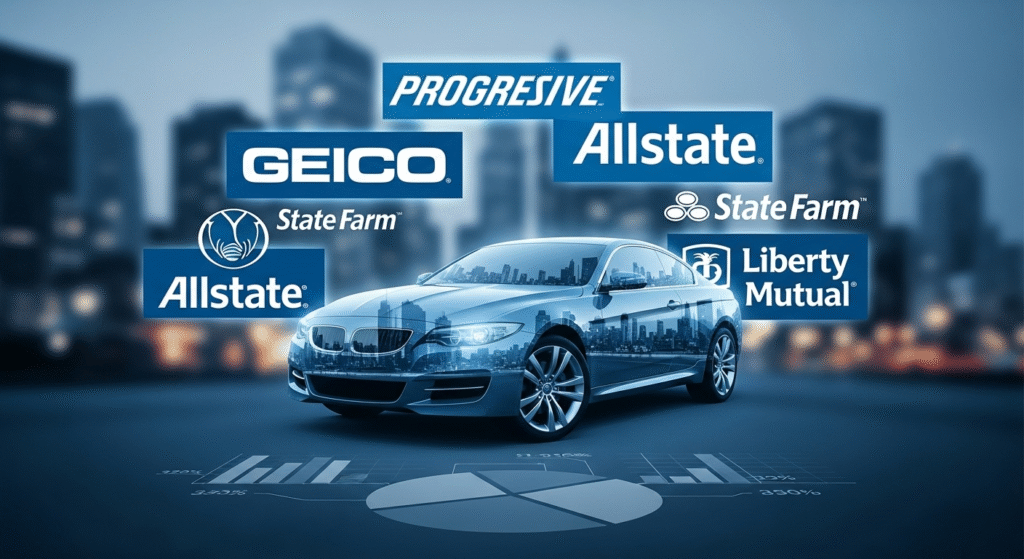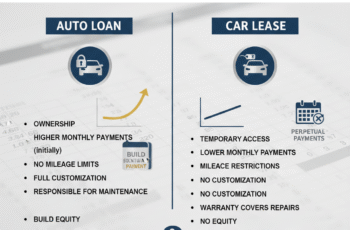Best Insurance Companies for Car Owners in the United States: For millions of Americans, a car is more than just transportation; it’s a lifeline to work, family, and freedom. But with that freedom comes a critical responsibility: car insurance. More than just a legal requirement, robust auto insurance is a financial safety net, protecting you from the potentially devastating costs of accidents, theft, and unforeseen damages.
However, navigating the vast and often complex landscape of car insurance providers in the United States can feel like a daunting task. With countless companies vying for your business, each promising the “best” rates and coverage, how does a car owner truly discern which insurer stands out from the crowd?
This comprehensive guide will cut through the noise, providing an in-depth exploration of the top-tier car insurance companies operating across the U.S. We won’t just list names; we’ll dissect what makes an insurer “best” for different types of drivers, examine the critical factors to consider, and equip you with the knowledge to make an informed decision that safeguards your vehicle, your finances, and your peace of mind.
Understanding the Pillars of Protection: What is Car Insurance and Why Do You Need It?
Before we dive into specific companies, let’s establish a foundational understanding of car insurance itself. At its core, car insurance is a contract between you and an insurance company, where you pay a premium, and in return, the insurer agrees to cover financial losses stemming from specific events involving your vehicle.

Why is it Mandatory?
Almost every state in the U.S. mandates some form of auto insurance. This is primarily to ensure that drivers can financially compensate others for damages or injuries they cause in an accident. Without it, innocent victims could be left with astronomical medical bills or repair costs.
Key Types of Car Insurance Coverage:
Understanding these is crucial for comparing policies:
- Liability Coverage (Mandatory in most states): This covers damages and injuries you cause to others.
- Bodily Injury Liability: Pays for medical expenses, lost wages, and pain and suffering for those injured in an accident you cause.
- Property Damage Liability: Pays for damage you cause to another person’s property (e.g., their car, fence, building).
- Collision Coverage: Pays for damage to your own car resulting from a collision with another vehicle or object, regardless of who is at fault.
- Comprehensive Coverage: Pays for damage to your own car from non-collision events, such as theft, vandalism, fire, natural disasters (hail, floods), or hitting an animal.
- Uninsured/Underinsured Motorist (UM/UIM) Coverage: Protects you if you’re hit by a driver who either has no insurance or insufficient insurance to cover your damages.
- Personal Injury Protection (PIP) / Medical Payments (MedPay): Covers medical expenses for you and your passengers, regardless of fault. PIP often includes lost wages and other non-medical expenses.
- Optional Coverages (Vary by insurer):
- Roadside Assistance: Towing, jump-starts, flat tire changes.
- Rental Car Reimbursement: Covers the cost of a rental car while yours is being repaired.
- Gap Insurance: Pays the difference between your car’s actual cash value and what you still owe on your loan if your car is totaled.
- New Car Replacement: Replaces your totaled new car with a brand new one (within certain age limits).
- Accident Forgiveness: Prevents your rates from increasing after your first at-fault accident.
Defining “Best”: It’s Not One-Size-Fits-All
There’s no single “best” car insurance company for everyone. What constitutes “best” is highly subjective and depends on your unique circumstances, priorities, and budget. When we talk about the top companies, we’re looking at insurers that excel in various critical areas:
- Affordability: Competitive premiums for the coverage provided.
- Customer Service & Claims Handling: Responsive, efficient, and fair claims process, and helpful support.
- Coverage Options: A wide range of standard and optional coverages to tailor policies.
- Discounts: Numerous opportunities to lower premiums.
- Financial Strength: A high rating from agencies like AM Best indicates the company’s ability to pay claims.
- Technological Innovation: User-friendly apps, online tools, telematics programs.
- Accessibility: Broad availability across states.
The “best” company for a young driver with a new car will likely differ from the “best” for a senior driver with a spotless record, or a family needing multiple policies.
Spotlighting the Leaders: Top Car Insurance Companies in the U.S.
Here, we’ll highlight some of the most prominent and highly-rated car insurance companies, categorizing them by their common strengths.
1. For Overall Value & Widespread Availability: State Farm & GEICO
These two giants consistently rank high for their broad appeal, competitive pricing, and extensive reach across the U.S.
- State Farm:
- Strengths: Largest auto insurer in the U.S. by market share, known for its vast network of local agents providing personalized service. Strong financial stability. Offers a wide array of products beyond auto, making bundling easy. Good for those who prefer an in-person, human touch.
- Potential Drawbacks: Rates can sometimes be higher for certain demographics compared to purely online insurers.
- Key Programs: Drive Safe & Save (telematics), Steer Clear (for young drivers).
- GEICO:
- Strengths: Famous for its aggressive pricing and extensive discount portfolio. Exceptionally strong online and mobile experience, making it ideal for tech-savvy customers who prefer to manage policies digitally. Often highly competitive for drivers with clean records.
- Potential Drawbacks: Customer service can feel less personal compared to agent-driven models.
- Key Programs: DriveEasy (telematics), multi-policy, military, federal employee discounts.
2. For Exceptional Customer Service & Claims Handling: USAA & Amica Mutual
These companies frequently top charts for customer satisfaction, even if they aren’t the cheapest for everyone.
- USAA:
- Strengths: Consistently rated #1 for customer satisfaction by J.D. Power. Exclusively serves military members, veterans, and their families. Known for fair pricing, outstanding claims service, and a deep understanding of military life’s unique needs. Offers an extensive suite of financial products.
- Potential Drawbacks: Eligibility is restricted to military families.
- Key Programs: Accident forgiveness, car replacement assistance, various military-specific discounts.
- Amica Mutual:
- Strengths: Another perennial leader in customer satisfaction, particularly known for its highly-rated claims process and financial stability. Offers unique dividend policies in some states, where policyholders can receive a portion of their premiums back.
- Potential Drawbacks: Not always the cheapest option; more limited availability than national giants.
- Key Programs: Good driver, loyalty, multi-policy discounts, unique dividend policy options.
3. For Innovative Tech & Usage-Based Insurance: Progressive & Allstate
These insurers are at the forefront of leveraging technology to personalize policies and offer unique discounts.
- Progressive:
- Strengths: A pioneer in telematics (Snapshot program), allowing drivers to potentially save based on their driving habits. Offers a “Name Your Price” tool and extensive online resources. Caters well to a wide range of credit scores and driving histories, including those with some blemishes.
- Potential Drawbacks: Snapshot program might not be for everyone; rates can vary widely.
- Key Programs: Snapshot, multi-policy, safe driver, online quote discounts.
- Allstate:
- Strengths: Strong network of local agents combined with robust digital tools. Known for its “Drivewise” telematics program which rewards safe driving. Offers unique coverages like new car replacement and deductible rewards. Good for those who value both personal interaction and digital convenience.
- Potential Drawbacks: Can be on the pricier side for some demographics.
- Key Programs: Drivewise, deductible rewards, accident forgiveness, multi-policy discounts.
4. For Bundling & Comprehensive Home/Auto Needs: Liberty Mutual & Farmers
These companies excel if you’re looking to insure multiple assets with one provider.
- Liberty Mutual:
- Strengths: Offers a broad range of insurance products (home, auto, life) making it ideal for bundling discounts. Strong national presence and agent network. Provides various unique coverage options and discounts.
- Potential Drawbacks: Rates can be higher than some competitors for standalone auto policies.
- Key Programs: RightTrack (telematics), multi-policy, safe driver, vehicle safety feature discounts.
- Farmers:
- Strengths: Known for its network of local agents who provide personalized advice. Offers a wide array of coverage options and specialty policies. Strong focus on building long-term customer relationships and providing comprehensive insurance solutions.
- Potential Drawbacks: Can be more expensive; customer service reviews are sometimes mixed depending on the agent.
- Key Programs: Signal (telematics), multi-policy, good student, professional group discounts.
5. For Niche Markets & Specific Needs: Erie Insurance & Travelers
These insurers might not be as universally known but offer excellent service or specialized options.
- Erie Insurance:
- Strengths: Highly rated for customer satisfaction and competitive rates, particularly in its operating regions (primarily East Coast and Midwest). Known for strong customer loyalty and excellent claims service. Offers “Rate Lock” feature in some states, preventing rate increases until policy changes.
- Potential Drawbacks: Limited geographic availability.
- Key Programs: Rate Lock, diminishing deductible, accident forgiveness (for loyal customers).
- Travelers:
- Strengths: Offers a robust selection of coverage options and good discounts, especially for safe drivers and bundles. Known for its financial stability and strong reputation. Good for those who want comprehensive coverage choices.
- Potential Drawbacks: Rates can vary significantly; online experience might not be as cutting-edge as some competitors.
- Key Programs: IntelliDrive (telematics), multi-policy, safe driver, hybrid/electric car discounts.
The Smart Approach: How to Get the Best Car Insurance Rates
Finding the “best” company isn’t just about brand recognition; it’s about finding the best fit for you. Here’s how to approach the quoting process strategically:
- Understand Your Needs:
- What level of coverage do you require (state minimum vs. full coverage)?
- What deductible are you comfortable with?
- Do you need any optional coverages (e.g., roadside assistance, rental reimbursement)?
- Gather Your Information:
- Vehicle details (VIN, make, model, year, mileage).
- Personal information for all drivers (DOB, driver’s license numbers, occupation).
- Driving history (accidents, violations, claims history).
- Current insurance policy details (if applicable).
- Shop Around – Compare Quotes from Multiple Providers:
- This is the single most important step. Rates can vary by hundreds or even thousands of dollars for the exact same coverage across different insurers.
- Use online comparison tools (e.g., NerdWallet, Policygenius, The Zebra) in addition to getting direct quotes from individual company websites.
- Don’t just get quotes from the big names; also check regional insurers.
- Get at least 3-5 quotes.
- Inquire About All Possible Discounts:
- Don’t assume discounts are automatically applied. Ask about every discount category:
- Bundling: Homeowners, renters, life insurance with the same company.
- Safe Driver: Accident-free, no tickets.
- Telematics/Usage-Based: Programs like Snapshot, Drivewise, RightTrack.
- Good Student: For young drivers with good grades.
- Anti-Theft Devices: Alarms, tracking systems.
- Paid-in-Full: Paying your premium upfront.
- Automatic Payments/Paperless Billing.
- Military, Federal Employee, Alumni, Professional Organizations.
- Multi-Car: Insuring more than one vehicle.
- Don’t assume discounts are automatically applied. Ask about every discount category:
- Review Coverage Details, Not Just Price:
- Ensure you’re comparing apples to apples. A cheaper quote might offer less coverage, higher deductibles, or fewer benefits.
- Read the policy documents carefully before committing.
Beyond the Premium: What Else to Consider When Choosing an Insurer
While price is often a primary driver, savvy car owners look deeper.
- Financial Stability:
- Check ratings from agencies like AM Best (A++ to B+ are generally good). A financially strong insurer can reliably pay claims.
- Customer Service & Claims Reputation:
- Read online reviews (Trustpilot, Google Reviews, BBB).
- Check J.D. Power ratings for customer satisfaction and claims handling.
- Ask friends and family for recommendations based on their claims experiences. A smooth claims process is invaluable after an accident.
- Digital Tools & Mobile App:
- Does the company offer a user-friendly website and a robust mobile app for managing your policy, making payments, and filing claims? This can significantly enhance your experience.
- Local Agent vs. Online/Call Center Model:
- Do you prefer the personalized service of a local agent who can advise you, or are you comfortable managing your policy entirely online or via phone? Companies like State Farm and Allstate offer agents, while GEICO and Progressive are more direct.
- Unique Coverage Options:
- Does the company offer specialized coverages that are important to you (e.g., new car replacement, custom parts and equipment coverage, rideshare insurance)?
Smart Strategies to Lower Your Car Insurance Costs
Beyond choosing the right company, you have control over several factors that influence your premiums.
- Maintain a Clean Driving Record: Accidents and traffic violations significantly increase your rates. Drive safely!
- Improve Your Credit Score: In most states, your credit-based insurance score (distinct from your general credit score) plays a role. A higher score often leads to lower premiums.
- Choose a Higher Deductible: Opting for a higher deductible (the amount you pay out-of-pocket before insurance kicks in) will lower your premium. Just ensure you can afford to pay that deductible if you have a claim.
- Reduce Your Mileage: If you drive less, you might qualify for low-mileage discounts or usage-based insurance programs.
- Consider the Car You Drive: Insuring a sports car or a luxury vehicle will almost always be more expensive than a modest, family-friendly sedan. Research insurance costs before buying a new car.
- Review Your Coverage Regularly: Annually review your policy. As your car ages, you might consider dropping collision or comprehensive coverage if its value no longer justifies the premium.
- Take a Defensive Driving Course: Some insurers offer discounts for completing approved defensive driving courses.
- Install Safety Features: Anti-theft devices, dash cams, and other safety enhancements can sometimes lead to discounts.
What to Do After an Accident: A Quick Guide
Even with the best insurance, accidents happen. Knowing what to do can save you stress and ensure a smooth claims process.
- Stay Calm & Ensure Safety: Move to a safe location if possible.
- Check for Injuries: Assess yourself and others involved. Call 911 immediately if anyone is injured.
- Call the Police: Even for minor accidents, a police report can be crucial for insurance claims.
- Exchange Information: Get names, contact details, insurance information, and vehicle details from all drivers involved.
- Document the Scene: Take photos of vehicle damage, the surrounding area, road conditions, and any relevant traffic signs.
- Do Not Admit Fault: Stick to facts.
- Contact Your Insurance Company: Report the accident as soon as possible, ideally from the scene. They will guide you through the claims process.
- Keep Records: Document all communications with your insurer and other parties.
The Road Ahead: Future Trends in Car Insurance
The car insurance industry is dynamic, constantly adapting to new technologies and societal shifts.
- Telematics Dominance: Usage-based insurance programs will become even more prevalent and sophisticated, offering highly personalized premiums based on actual driving behavior.
- Autonomous Vehicles: As self-driving technology advances, questions about liability in accidents will reshape policies and potentially lower premiums due to fewer human errors.
- Data Analytics & AI: Insurers will leverage more data points (e.g., traffic patterns, weather data, smart home data) to assess risk more accurately.
- On-Demand/Pay-Per-Mile Insurance: Growing in popularity, this model caters to those who drive infrequently, charging based on actual mileage.
- Embedded Insurance: Insurance options offered at the point of sale (e.g., when buying a car) integrated directly into the purchase process.
Driving Towards Peace of Mind
Choosing the best car insurance company is a vital decision that extends far beyond a monthly premium. It’s about securing a reliable partner who will stand by you when you need them most. By understanding your needs, diligently comparing options, leveraging available discounts, and prioritizing strong customer service and financial stability, you can confidently select an insurer that offers optimal protection and value.
Drive smart, stay informed, and enjoy the peace of mind that comes with knowing you’re well-covered on the road ahead.
Next Steps:
- Would you like me to expand on any specific company’s offerings or details?
- Do you want to add a section on state-specific insurance requirements or variations?
- I can start generating images. For instance, an image depicting different types of car insurance coverage, or a graphic comparing different insurers. Let me know what you’d like!

